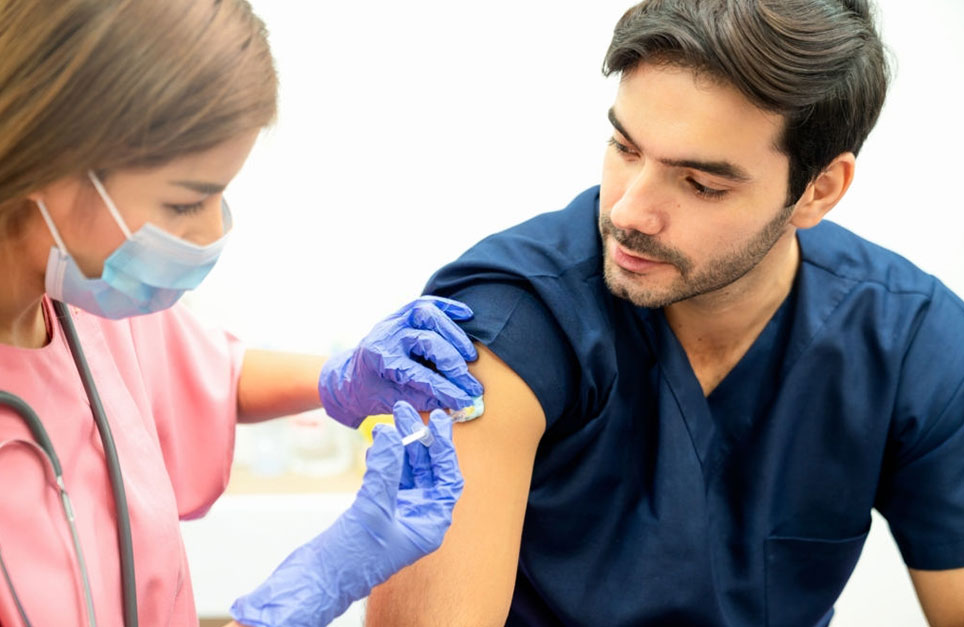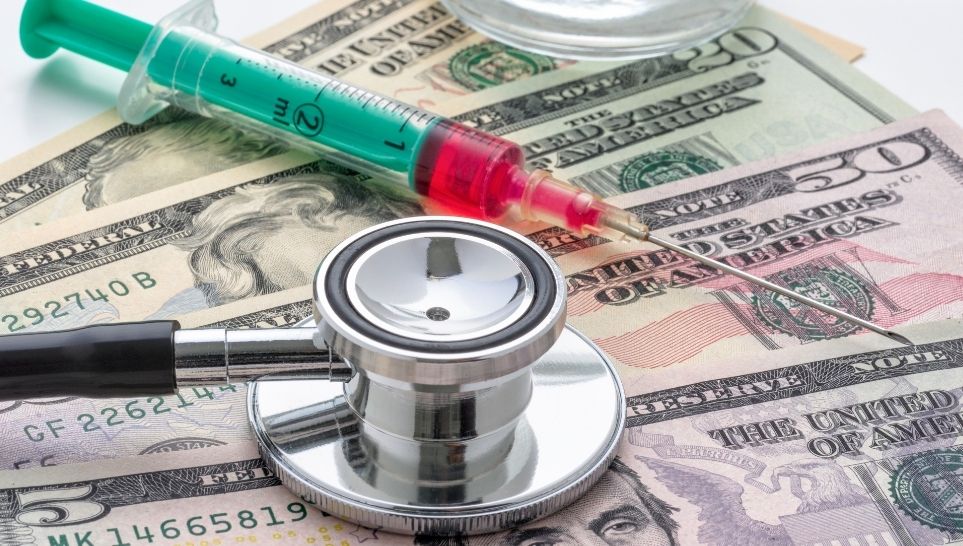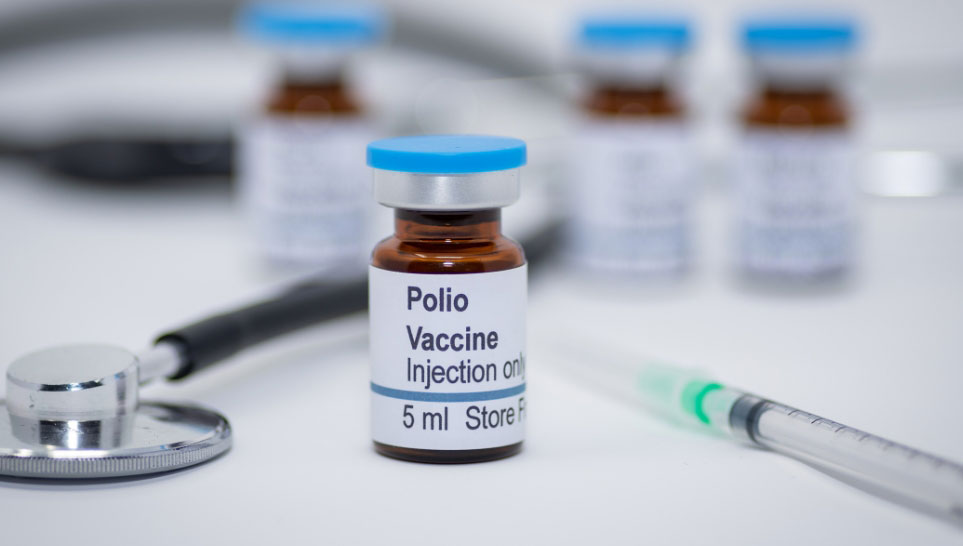Guillain Barre Syndrome is a rare autoimmune disorder that causes the immune system to attack and damage nerve cells. Symptoms of GBS start as numbness or tingling in the arms and legs that can progress rapidly leading to hospitalization. If you received a vaccine and develop numbness and tingling in the legs, hands, or feet then you need to go to the emergency room.
Since the 1970s, the flu shot has been associated with causing GBS. Guillain barre flu shot cases are complex and require an experienced vaccine injury lawyer like Sadaka Law to handle your case in the Vaccine Injury Compensation Program (VICP).
While most Guillain-Barre Syndrome cases are treatable, the symptoms of pain, numbness, and tingling (paresthesia), and sometimes weakness may last for weeks or years. GBS can lead to death, paralysis, or life-long disabilities. Some people who suffer from Guillain-Barre Syndrome need a breathing tube to live. GBS treatment is with steroids and a medication called intravenous immunoglobulin (IVIG). If you suffered from GBS as a result of the influenza vaccine the results could be catastrophic. GBS can occur at any time and at any age.
GBS is caused when the body’s immune system attacks the nerves. This can be triggered by several things, including certain infections, influenza vaccine, or even pregnancy. Most cases of GBS are called “acute inflammatory demyelinating polyradiculoneuropathy” (AIDP). AIDP accounts for about 85 percent of all cases of GBS, but there are other types like acute motor axonal neuropathy described below. Vaccinations like the flu shot are known triggers of Guillian-Barre Syndrome and the vaccine injury compensation program was set up by the federal government in the 1980s to help vaccine-injured people.
GBS can cause death, paralysis, or life-long disability. We are here to help you. Influenza vaccines are known to trigger GBS. There is hope that you can be compensated for pain and suffering, medical bills, and lost income. We have helped 100s of vaccine-injured people, including injuries from the influenza vaccine, file a vaccine injury claim. An experienced vaccine lawyer like Sadaka Law can help guide you through a very complex process. Call us for a consultation to see if you qualify for the federal government’s Vaccine Injury Compensation Program (VICP). Our consultations are free and confidential.
What is causing GBS? Guillain-Barre Syndrome Causes
Medical science recognizes infections and vaccines causing GBS. Influenza vaccine is a known trigger for this autoimmune disease. The U.S. government recently recognized people who suffer GBS from the flu shot should receive compensation from the Vaccine Injury Compensation Program by adding the condition of the vaccine injury table.
Vaccine caused GBS
People suffer GBS days or weeks after being vaccinated, like with the influenza vaccine, every year. The symptoms usually appear 3 to 4 weeks after vaccination but can appear as soon as 3 days. Typical GBS usually begins with numbness and tingling in the hands and/or legs. However, there are different types of GBS like Miller-Fisher where the symptoms usually begin in the eyes.
Muscle weakness is not usually an initial symptom of GBS. Muscle weakness is usually a sign of another condition called CIDP. CIDP can also be caused by influenza vaccines.
ACT FAST, you only have 3 years to file a vaccine injury claim
You must start the process as soon as possible. A vaccine injury claim is NOT a vaccine lawsuit. Completing the claims process set up by the federal government called the Vaccine Injury Compensation Program is a necessary step before having the legal right to start a vaccine lawsuit against the manufacturer. These cases are extremely complex and require that you get started as soon as possible. Do not hesitate to call our vaccine lawyer at Sadaka Law for some guidance on your options.
Tetanus, hepatitis, and influenza vaccines are the most common culprits, although recently the link between the Tetanus GBS has weakened.
The influenza vaccination changes every year so the FDA approves a new vaccine every year. Because the virus changes every year, no studies into influenza vaccine GBS have been successful in isolating a specific viral particle that triggers the condition. The triggering components for GBS in tetanus and hepatitis shots are also unclear.
Infections
Guillain-Barre Syndrome can also be caused by infection. In two-thirds of GBS cases, the condition develops after experiencing diarrhea or a respiratory illness for a few days. Studies indicate that Campylobacter jejuni, a bacterium, is another prominent risk factor. Other infections that can trigger GBS are:
- Viral gastroenteritis
- HIV
- Flu
- Cytomegalovirus
- Epstein Barr
- Glandular fever
- Tropical diseases (like dengue fever and Zika virus)
Variations of Guillain-Barre Syndrome
The Guillain-Barre Syndrome is a condition where the body attacks the peripheral nervous system (an autoimmune disorder). The immune system begins to treat the peripheral nerves as an invader and tries to destroy them resulting in damage to the nerve. The nerves that are damaged have trouble transmitting signals to the brain, resulting in numbness, tingling, and paralysis. Sometimes GBS can lead to permanent nerve damage.
There are several types of vaccination caused GBS, including
- Acute Inflammatory Demyelinating Polyneuropathy (AIDP). This is the official name for Guillain-Barre Syndrome (GBS) and the most common type of GBS diagnosed.
- Acute Idiopathic Polyneuropathy.
- Acute Motor Axonal Neuropathy (AMAN)
- Acute Motor Sensory Axonal Neuropathy (AMSAN).
- Acute Panautonomic Neuropathy
- Bickerstaff’s Brainstem Encephalitis (BBE)
- Chronic Inflammatory Demyelinating Polyneuropathy (CIDP). CIDP is not a form of GBS, but a separate condition. However, most people think of CIDP as chronic GBS because they can appear similar at first.
- Miller Fisher Syndrome (MFS). Miller Fisher Syndrome is a variation of Guillain-Barre Syndrome that affects the cranial nerve, causing diplopia (double vision), areflexia, dysarthria, and ataxia.
- Pharyngeal-Cervical-Brachial Variant
Guillain-Barre Syndrome and the Influenza Vaccine

Medical science first officially recorded the connection between GBS and the flu vaccine after the 1976 swine flu pandemic vaccination program in the U.S. The National Academy of Medicine reviewed the reports and peer-reviewed literature in 2003, indicating that the influenza vaccine recipients of the 1976 swine flu vaccine were at a greater risk of developing GBS.
The 1979 paper from Schonberger found that there was an increased risk of GBS after receiving vaccines containing influenza A. You can read the abstract for yourself here – Guillain-Barre syndrome following vaccination in the National Influenza Immunization Program, United States, 1976–1977 – PubMed (nih.gov)
Schonberger, L. B., et al. (1979). “Guillain-Barre syndrome following vaccination in the National Influenza Immunization Program, United States, 1976–1977.” Am J Epidemiol 110(2): 105-123.
Because of an increase in the number of reports of Guillian-Barre syndrome (GBS) following the swine influenza vaccination, the program was suspended on December 16, 1976, and nationwide surveillance for GBS was begun. This surveillance uncovered a total of 1098 patients with onset of GBS from October 1, 1976, to January 31, 1977, from all 50 states, District of Columbia, and Puerto Rico. A total of 532 patients had recently received a swine flu vaccination before their onset of GBS (vaccinated cases), and 15 patients received a vaccination after their onset of GBS.
People who received the swine influenza vaccination population had a significantly elevated risk of Guillain Barre Syndrome in every adult age group within the 5 weeks after vaccination. According to Schonberger’s study, one in 100,000 recipients of the 1976 flu shot developed GBS.
The swine flu panic of 1976 holds crucial lessons for the government and health officials. The panic in 1976 was partly because of the erroneous belief that the 1918-19 flu pandemic, which killed half a million Americans and as many as 50 million worldwide, was caused by swine flu virus. Recent research suggests instead that the 1918-19 flu pandemic was caused by bird or avian flu.
Regardless, due to the panic in 1976, a disease that was uncommon to many people became many people’s focus and the center of attention. Even to this day, it causes concern to many and that disease is called Guillain-Barré syndrome, the most common form of nerve damage related to vaccines.
The episode began in February 1976 when an Army recruit at Ft. Dix, N.J., fell ill and died from a swine flu virus thought to be similar to the 1918 strain. Several other soldiers at the base also became ill. Shortly thereafter, Wenzel and his colleagues reported two cases of the flu strain in Virginia.
“That raised the concern that the original cluster at Ft. Dix had spread beyond New Jersey,” said Wenzel, former president of the International Society for Infectious Diseases.
At the CDC, Dr. David J. Sencer, the CDC Director who led the government’s response to the threat and was later fired, solicited the opinions of infectious disease specialists nationwide and,in March, called on President Ford and Congress to begin a mass inoculation.
The $137-million program began in early October but within days reports emerged that the vaccine appeared to increase the risk for Guillain-Barre syndrome.
Guillain-Barré syndrome (GBS) is a rare disorder in which a person’s own immune system damages the nerves causing muscle weakness and sometimes paralysis. GBS can cause symptoms that last for as little as a few weeks or go on for several months. Most people recover fully from GBS but some people have nerve damage that does not go away. In rare cases, people have died of GBS, usually from not being able to breathe due to the weakness of their breathing muscles.
The government suspended the program on Dec. 16 with increasing concern from reports saying the vaccine was touching off neurological problems, especially Guillain-Barre syndrome. The program inoculated 40 million people, almost 25% of the population, who waited in long lines at schools and clinics for the flu that never came.
More than 500 people are thought to have developed Guillain-Barre syndrome after receiving the vaccine; 25 died. No one completely understands the causes of GBS, but the condition can develop after a bout with infection or following surgery or vaccination. The federal government paid millions in damages to people or their families.
Since 1976, many studies have been done to see if other flu vaccines may cause GBS. According to the CDC, in most studies, no link was found between the flu vaccine and GBS. However, two studies did suggest that about 1 more person out of 1 million people vaccinated with the seasonal flu vaccine may develop GBS. This continues to be studied. For the most part, the chance of getting very ill from flu is far higher than the chance of getting GBS after getting the flu vaccine, according to the CDC.
Vaccine Reaction and GBS Symptoms
According to the Vaccine Injury Table, it takes 3 to 42 days for initial symptoms of GBS to develop after a flu shot. Initial symptoms of GBS are numbness and tingling in the arms, legs, hands, and feet as the body attacks the peripheral nerves. Sometimes GBS can cause severe pain. As GBS progress it worsens, GBS symptoms intensify, including:
- Difficulty walking, maintaining balance, breathing, bladder control, and bowel movements.
- Loss of reflexes or eye and facial control
- Abrupt changes in blood pressure and heart rate
People affected by Guillain-Barre syndrome may first be tingling in their fingers and toes. About 10% of the time, the abnormal sensation begins in the upper body, specifically in the arms and/or face. Other symptoms may include:
- Aching or cramping pain that may get worse at night
- Back pain
- Heart and blood pressure fluctuations
- Inability to climb stairs
- Inability to move one’s eyes
- Inability to walk
- Loss of bladder or bowel function
- “Pins and needles” sensation in the extremities
- Rapid heart rate
- Slower-than-usual reflexes
- Trouble speaking
- Unsteady walking
- Unusual tiredness
- Muscle weakness in the legs
- Sensory disturbance
In some cases, tingling spreads throughout the body due to the destruction of the peripheral nerve cells, and if left untreated it may cause paralysis and permanent nerve damage. Signs that Guillain-Barre symptoms are a medical emergency include:
- Choking on saliva
- Difficulty breathing
- Difficulty swallowing
- Rapidly spreading tingling or weakness
- Shortness of breath when lying flat on one’s back.
- Tingling that began in the feet spreading upwards throughout the body.
Individuals who have any of these symptoms should seek emergency medical attention immediately. There are tests to diagnose GBS, like EMG and lumbar puncture. Guillain-Barre syndrome may present as a medical crisis that requires hospitalization, most people recover from the acute symptoms of the condition, although some continue to experience tingling and weakness in the extremities and/or fatigue after the attack on their peripheral nervous system.
Recovery generally begins after about 2-4 weeks and may take anywhere from six months to three years. Treatment is with steroids and intravenous immunoglobulin. About 5% of patients who have recovered from Guillain-Barre syndrome will experience a relapse. Children seem to be more likely to recover completely than adults. Of all people who have had Guillain-Barre syndrome, about 85% recovery completely with no permanent nerve damage. The sooner treatment is started, the greater the patient’s chances of complete recovery.
What to do after Guillain-Barre Syndrome Diagnosis
Receiving a GBS diagnosis after a vaccine like a flu shot is scary. What does the future look like? Will I ever get back what I lost? The most important step is to finish your treatment, including physical therapy. Failure to follow treatment leads to an increased risk of developing permanent nerve damage. Once you are back on your feet, you can seek help in getting your and your family’s life back to normal by filing a claim in National Vaccine Injury Compensation Program (NVICP). The Vaccine Injury Compensation Program provides financial compensation, including costs of future medical care and lost wages. The Program can help provide the closure you need.
You only have 3 years to file a claim.
The Vaccine Injury Compensation Program has strict time limits and you must start the process as soon as possible. These cases are extremely complex and require time to investigate and develop. You need an experienced vaccine lawyer like Sadaka Law to help see you through this process.
After receiving a GBS diagnosis following a flu shot, take time to:
- Seek medical attention.
- File a VAERs Report. VAERS stands for Vaccine Adverse Event Reporting System. This is a surveillance program that is supervised both by the CDC and the FDA. Essentially, VAERS is used to spot safety issues with vaccines. See our video for a step-by-step guide on filing a VAERS report.
- Learn about your rights to Compensation: Seeking financial compensation under the National Vaccine Injury Compensation Program differs considerably from lawsuits. First, it is not a vaccine lawsuit, it is a claims process centered in the U.S. Court of Federal Claims, Office of Special Masters. A Special Master who is selected for the program for a certain number of years will decide your case. Over three decades, the program has awarded more than $3 billion to victims of vaccine-related injuries or deaths. The program also covers the costs and reasonable attorney fees. Our law firm has recovered millions for vaccine-injured clients. See some of our results here.
Mark Sadaka explains the vaccine injury compensation process and how its different in this video.
- Connect with Our Experienced Vaccine Lawyer Team: We have over 15 years of experience in this medically complex field and recovered millions of dollars for our clients. Increase your chances of fair compensation by working with a qualified vaccine injury attorney. You need an experienced vaccine lawyer like Sadaka Law when you are ready to find closure and get the financial compensation you deserve.
Guillain-Barre Syndrome (GBS) Treatment
Medical history and the GBS variant affect a patient’s prognosis and claim. Most GBS patients experience a full recovery within six to twelve months, while about one-third experience permanent nerve injury (like pain and muscle weakness that can last for three years or more). Shockingly, relapsing (experiencing GBS symptoms again) after recovery is possible. In rare and extreme cases, a patient may have to live with permanent difficulties from the illness, such as:
- Chronic pain
- Paralysis
- Sensory impairments
- Blood pressure changes
- Respiratory failure that requires a breathing tube
The recommended way to avoid long-term complications is to seek treatment as quickly as possible. The two most effective forms of treatment for GBS variants are intravenous immunoglobulin therapy and plasma exchange therapy. Depending on the patient’s condition, physical therapy and mechanical ventilatory assistance may also be necessary. Treatment for GBS includes steroids and monoclonal antibody treatment. The use of Eculizumab, an autoimmune medication, is also under evaluation as a treatment for GBS with promising results.
FAQs
Can GBS cause my lungs to stop working?
Types of Respiratory Failure Caused by Guillain-Barré Syndrome
Approximate 30% of people with Guillain-Barré Syndrome suffer from respiratory failure and are admitted into the hospital and placed into an intensive care unit (ICU). After they are admitted, they must receive invasive mechanical ventilation. Invasive means that the procedure performed on the patient involved putting a tube into the mouth and directing it through the throat and into the lungs. The advanced weakness of the lungs (the inspiratory and the expiratory muscles) and their proper functioning is what leads to respiratory failure.
Another serious symptom that patients might experience is pulmonary aspiration (also referred to as aspiration pneumonia). When that happens, the patient inhales stomach acids, food or saliva into each lung. Inhaling saliva, food or stomach acids into the lungs allows bacteria to enter and results in serious respiratory complications (like lung disease). Inspiratory muscles help with breathing (getting air into each lung), and expiratory muscles help push the air out of each lung.
Who makes sure that flu vaccines are safe?
The FDA (Food and Drug Administration) verifies the safety of all vaccines before hospitals apply these to the American public. The CDC performs ongoing monitoring of vaccine safety through the following methods:
- Vaccine Adverse Event Reporting System (VAERS): An early warning system, VAERS, helps the CDC and FDA monitor all problems that occur after vaccinations. If a person experiences a small or complex vaccine side-effect, VAERS records it. Anyone can report symptoms via the platform, including patients, relatives, pharmacists, health care providers, and vaccine manufacturers.
- Vaccine Safety Datalink (VSD): As a joint effort between the CDC and eight integrated health care organizations, VSD performs ongoing vaccine safety monitoring and research.
What Is VAERS?
VAERS stands for Vaccine Adverse Event Reporting System. This is a surveillance program that is supervised both by the CDC and the FDA. It is used to bring swift attention to any potential health issues with the use of vaccines. The Vaccine Adverse Event Reporting System was set up around the same time as the National Childhood Vaccine Injury Act.
What is the National Childhood Vaccine Injury Act?
This Act put into law in response to the large number of vaccine lawsuits in the 1970s and 1980s. Vaccine manufacturers threatened to go out of business so congress took action by creating the National Childhood Vaccine Injury Act and, with it, the Vaccine Injury Compensation Program.
The Act allows the federal government to step in to compensate people who are injured from vaccines. The Act provides a process for compensation but does not prevent someone from filing a vaccine lawsuit after certain milestones are met in the process.
How VAERS is used?
Essentially, VAERS is used to keep a close watch on any reports that people have had with vaccines. Reporting to VAERS is the ONLY way to study vaccine safety. If you believe that you received a side effect from vaccines that has impacted your health, then you should make a report with the VAERS system. You can easily do this online at the Health and Human Services VAERS website.
How common is GBS among people who have had flu shots?
In the U.S., there are about 80 to 160 reported GBS cases per week. The number of GBS cases from flu shots changes yearly.
Is it difficult to file a GBS claim after a flu shot injury?
The simple answer is that it depends. There are some cases where compensation for Guillain-Barre Syndrome caused by flu shot was extremely difficult – the government did not recognize GBS as an injury related to vaccines. GBS was not on the Vaccine Injury Table, which contains the side effects known to be linked to vaccines. If any vaccine is not on the list, the federal government has stricter requirements for proving eligibility for financial compensation. However, in 2017, the U.S. Department of Health and Human Services (DHHS) added GBS for flu shot recipients to the Vaccine Injury Table.
Now that GBS is on the list, injured parties become eligible for compensation by submitting evidence of their diagnosis. But the government does not do this easily. You need an experienced vaccine lawyer like Sadaka Law to help see you through this process.
Can I sue a vaccine manufacturer?
The National Childhood Vaccine Injury Act restricts injured parties from suing vaccine manufacturers. The Act offers injured parties a streamlined alternative for seeking compensation through the National Vaccine Injury Compensation Program (NVICP). The NVICP offers a no-cost, no-fault option for receiving compensation for vaccine-related injuries. Unlike a typical personal injury lawsuit, pursuing compensation under the NVICP is less time-consuming. Most cases end amicably if the petitioner provides the required evidence and follows the appropriate procedure. Our experienced vaccine injury lawyer handles your case and can guide you through the process.
How much does it cost to file a claim under the NVICP?
If you hire an experienced vaccine lawyer like Sadaka Law there should be no cost to receive compensation for your Guillian-Barre Syndrome (GBS). There is a filing fee and the costs of the copies of medical records. However, legal fees and costs are covered by the National Vaccine Injury Compensation Program. After a successful vaccine claim, the federal claims court will award compensation that covers your expenses and legal fees, which will be different from the sum awarded for your injuries.
What is the statute of limitations for a vaccine-related Guillain-Barre Syndrome (GBS) claim?
The NVICP provides claimants with three years to submit a claim for injuries from a vaccine. The period begins from the day you experience the first symptom of the injury. If a patient dies after receiving the vaccine, the statute of limitations is four years from the first symptom (or two years from the date of death). We have recovered millions of dollars for people injured by vaccines including, Guillain-Barre Syndrome (GBS) vaccine injury.
If you or a loved one recently received a GBS diagnosis after a flu shot or other vaccination, get in touch with an experienced vaccine lawyer like Sadaka Law. Every year, there are many flu shot GBS cases and we are here to help you at no cost. Sadaka Law helps you navigate the process, filing a vaccine injury claim, and putting together a solid case. Our team has over a decade of experience helping families nationwide seek proper compensation for various vaccine injuries, including GBS.
You only have 3 years to file a claim.
The VICP has a strict 3-year time limit. You must start the process as soon as possible due to the complexity of the issues. You need an experienced vaccine lawyer like Sadaka Law to help see you through this process.
We have assisted hundreds of vaccine-injured people in finding closure and financial compensation for their injuries. Are you the parent or legal guardian of someone injured by a vaccine covered by the VICP? Or the legal representative of an estate of someone whose death was due to a vaccine injury? Let our experienced lawyers assist you. Contact an experienced vaccine lawyer like Sadaka Law for an initial consultation at 800-810-3457 today.
GBS AFTER FLU VACCINE
$150,000 + total settlement, including $110,000 lump sum award, for adult female who suffered from a typical Guillain-Barre Syndrome (GBS), chronic inflammatory demyelinating polyneuropathy (CIDP), and neurogenic bladder after receiving an influenza vaccine.
GBS AFTER TETANUS VACCINE
$305,000 settlement for a 35 year old man from NC who developed Guillain-Barre Syndrome (GBS) as a result of receiving the Tetanus-diphtheria, Td vaccine.
GBS AND CIDP AFTER FLU VACCINE
$5,328,078.77 total settlement which includes life care expenses, payment for lost earnings, and pain and suffering compensation for a 40 year old man from North Carolina who developed Guillain-Barre Syndrome (GBS) and chronic inflammatory demyelinating polyneuropathy (CIDP), as a result of the influenza vaccine.
GBS AND CIDP AFTER FLU VACCINE
$110,000.00 total settlement for a 32 year old woman from Wausau Wyoming who developed Guillain-Barre Syndrome (GBS) and chronic inflammatory demyelinating polyneuropathy (CIDP), as a result of the influenza vaccine.






